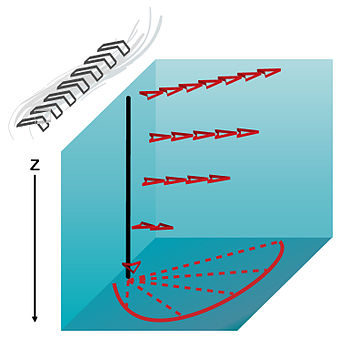
Back نقل إيكمان Arabic Transport d'Ekman Catalan Ekman-Transport German Transporte de Ekman Spanish انتقال اکمن Persian Transport d'Ekman French Ekman-transporto IO Trasporto di Ekman Italian എൿമാൻ വിസ്ഥാപനം Malayalam Angkutan Ekman Malay

Ekman transport is part of Ekman motion theory, first investigated in 1902 by Vagn Walfrid Ekman. Winds are the main source of energy for ocean circulation, and Ekman transport is a component of wind-driven ocean current.[1] Ekman transport occurs when ocean surface waters are influenced by the friction force acting on them via the wind. As the wind blows it casts a friction force on the ocean surface that drags the upper 10-100m of the water column with it.[2] However, due to the influence of the Coriolis effect, the ocean water moves at a 90° angle from the direction of the surface wind.[2] The direction of transport is dependent on the hemisphere: in the northern hemisphere, transport occurs at 90° clockwise from wind direction, while in the southern hemisphere it occurs at 90° anticlockwise.[3] This phenomenon was first noted by Fridtjof Nansen, who recorded that ice transport appeared to occur at an angle to the wind direction during his Arctic expedition of the 1890s.[4] Ekman transport has significant impacts on the biogeochemical properties of the world's oceans. This is because it leads to upwelling (Ekman suction) and downwelling (Ekman pumping) in order to obey mass conservation laws. Mass conservation, in reference to Ekman transfer, requires that any water displaced within an area must be replenished. This can be done by either Ekman suction or Ekman pumping depending on wind patterns.[1]
- ^ a b Sarmiento, Jorge L.; Gruber, Nicolas (2006). Ocean biogeochemical dynamics. Princeton University Press. ISBN 978-0-691-01707-5.
- ^ a b Emerson, Steven R.; Hedges, John I. (2017). Chemical Oceanography and the Marine Carbon Cycle. New York, United States of America: Cambridge University Press. ISBN 978-0-521-83313-4.
- ^ Colling, pp 42-44
- ^ Pond & Pickard, p 101
© MMXXIII Rich X Search. We shall prevail. All rights reserved. Rich X Search